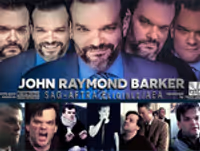Revivals: Do the Authors Have a Say?
MaronaDavies
Featured Actor Joined: 3/17/06
#25re: Revivals: Do the Authors Have a Say?
Posted: 9/11/06 at 4:42amI do agree, at some point you have to let go. I see the author's side on this one, though. Yes, there's room for interpretation, but I think that when you create something, you should be entitled to see it treated with respect. If the director does something with script that abandons your fundamental ideas or characters--and leaves YOUR name on the marquee--I can understand being upset.
#26re: Revivals: Do the Authors Have a Say?
Posted: 9/11/06 at 5:08am
"How long before authors and composers start asking control on how a song is sung or a line read? Will there be physical and racial requirements?"
SeanMartin: you have a point, but I think the real control issue is the "STRUCTURE" of the piece. Be it the harmonic structure of the music, or the dramatic structure of the entire show.
Changing scenes around or switching song order without the original author's approval is not the same as changing the original set pieces, costumes or lighting design. (Unless, of course, the original authors indicated certain colors or design concepts in their folios.)
Sean, I've seen your website and really like your work. You work, as you should, with whomever is directing your project. I can't imagine, as a designer, you would change a scene for your own purposes without the writers' or directors' approval.
"Time flies like an arrow, fruit flies like a banana." GMarx
#27re: Revivals: Do the Authors Have a Say?
Posted: 9/11/06 at 8:26am
the fallacy in your point, sean, is that the author is not included in the collaboration when someone reorders, rewrites, deletes or adds material. these things do happen when a writer is working with the production.
and adaptation is different than reviving. I agree that an adaptation should stay true to the source material, but historically, it has always been regarded the way it is now. verdi stated that otello was his version of the story--not shakespeare's. it's, of course, worthy of debate. but changing a script is like adding your own paint strokes to the mona lisa.
having said all that, I fully admit that I am a fan of those who makes smart cuts to shakespeare's plays.
I do believe that actors, directors, and designers should be allowed to work freely within the blueprint or skeleton of the script.
#28re: Revivals: Do the Authors Have a Say?
Posted: 9/11/06 at 8:55am
>> I see the author's side on this one, though. Yes, there's room for interpretation, but I think that when you create something, you should be entitled to see it treated with respect
But ths begs the question: whih author? Bergman's vision of the cast of SMILES OF A SUMEMR NIGHT or the ones we know in A LITTLE NIGHT MUSIC? Lloyd's concept of ANNIE or the one we know in the musical adaptation? These are not the same people: the musical Annie is positively saccharine compared to her comic strip counterpart. So tell me, why arent we up in arms when authors take such liberties with these classics? Should we not be defending *those* authors as well?
Heck, even everyone's lovefest around here: WICKED, which is a gross distortion of everything Baum wrote in his OZ books. Why are we not protesting that? Where's the line drawn? When it appears on a Broadway stage, and anything prior to that is dismissable?
>> I can't imagine, as a designer, you would change a scene for your own purposes without the writers' or directors' approval.
Nor would I. But you have to understand that I'm in the rather odd position with over 70% of my clients in that I usually bring the production concept to the table, rather than being told what the director's vision is. I havent seen a director's brief in years. And believe me: sometimes that's a headache because it's asking me to tap dance on three or four levels that I'd rather not. Nevertheless, most of my clients view ths skill as something that they almsost expect when approaching me to work on something. They *want* something different, but they dont have time to work one out, so they ask me to do it for them, because they know I have a good sense of what will and wont work.
That hasnt happened overnight: it's the result of working with some of them for almost a decade and deeloping their trust in me to deliver not only a good design (and thank you for those kind words) but a unique concept underneath it. And the reason for that is simple: a lot of these theatres are fast-turnaround, "we dont have time for conceptual discussions" kinds of places. Usually, a show is directed in three weeks and then presented. Prior to that, the director is working on something else (like, running the business side of the thestre itself) and, frankly, doesnt have time to play "what-if" games with me, even though a "what-if" is what they want. So I'm asked to play for them and come in with some new approach to the material. If they dont like the core concept, I scuttle it and come back with another one. That's my job. Sometimes I'll be a little insistent if it's something I feel works better than they think; when that happens, we'll discuss it. Sometimes I get to see it through. Sometimes I dont. When I dont, I dont get bent out of shape. I go back to the drawing board and go back to work.
An example: I was contracted to design MEFISTOFELE for Taconic Opera last winter for a spring production. I've worked with Dan Montez there for four years, and we work together well because he too likes to approach the standards with a sidelong glance or two. MEFISTOFELE is the Faust story, set in Germany in medieval times. It's a heavy, heavy production, technically. And it's Dan's favourite opera, so he was really looking forward to doing this. But he had no idea what he wanted, so my brief, such as it was, was "give me something different".
My initial design was a complex (for them, anyway) series of scrims and platforms that could be moved about in such a way that we could quickly get from one scene to another. But when Dan told me the venue was changing to an all-thrust stage (Imagine a wide version of the Guthrie), that had to go because there was no place to hang the rigging. He was even more thrown by the limitations of the space than I was, so he cut me loose and told me to deliver.
I came back with a set that was nothing more than a double bed and a row of hospital screens, along with a concept that said the entire opera was the last few hours' of an old man's life. In this version, Faust doesnt get his youth back: he thinks he does, and he goes through the entire work pretending to be this young stud, enamored by Venus no less, when he's still an old man about to die. But everything swirls around his deathbed.
Dan looked at it and said, "Uhm.... okay....." It was pretty audacious, when you consider what FAUST is supposed to be in the first place. For weeks, we tried mightily to make it work, but Dan finally had to tell me that, as much as he loved it, he just couldnt make it work like he knew it could, and could I please give him something else?
I did, of course, and it worked just as well. But there was no tantrums about how my precious work was being destroyed by the vision of an inept director. As much as I knew (and still feel) that this was stronger than what we ultimatly put on the stage, I had to trust my director.
Well, so should the author and the composer and the lyricist. If a director makes the conscious choice to tinker with a script and make what might seem fundamental changes to it, why not? It's going to run for two weeks and then disappear, so what's the ultimate harm, guys? Looking again at the ANNIE production (which, again, I think is genius), the authors should be comforted that there are thousands upon thousands of productions that faithfully render every note and every word as perfectly as resources allow. But if I were an author at this level, I'd *love* to see what someone did to make it different, to see how they could take my now-standard materual and give it a new direction.
#29re: Revivals: Do the Authors Have a Say?
Posted: 9/11/06 at 9:37am
the difference is that no one is publishing baum's book with changes. but when you makes changes to a script, you are doing just that. and the nature of adaptations is that the new work can be what it wants.
there is a difference between concept and changing the text. look at sweeney todd that just closed. look at the cabaret or nine revivals. all 3 were fantastic in that they had new concepts. but the scripts were only altered if and when the authors agreed.
great productions of operas and plays occur with wild design concepts and/or direction. the script is not and should not be changed without permission.
let's take annie--designing a darker production and having the direction and performances bring about a darker subtext would be fine. adding a new scene at the end without permission--not fine.
in the big scheme of things, we may simply have different philosophies of writing. but for now, the law is on the side of the writers. and knowing that, one can't cry when they get closed down.
#30re: Revivals: Do the Authors Have a Say?
Posted: 9/11/06 at 10:00am
>> great productions of operas and plays occur with wild design concepts and/or direction. the script is not and should not be changed without permission.
You might want to take a look at what's going on in the opera world these days. Directors dont think twice about rewriting the libretto and adding and cutting to tailor their concept. Remember the PIRATES OF PENZANCE production that was in Central Park back in the 1980s? Two songs were added from RUDDIGORE, one simply so there would be a patter song in the second act.
I've commented in other threads about the wholesale retakes on classics such as FLEDERMAUS and ABDUCTION FROM THE SERAGLIO that have run recently in Germany; these *completely* violate the intents of the pieces involved, and, yes, people were up in arms about them (in one case, almost literally)... but this is how the arts grow and evolve. Seeing works through new eyes allows us to expand our own experience with them.
Insofar as the law being on the side of the authors... uhm, technically, that's still a bit of a grey area.
Inosfar as Baum's book being safe, so is the published edition of ANNIE. No one's publshing it with a new, sadder ending. It's just a performance with one, an experiment in retelling a tired story, an adaptation of a work -- no different, truly, than when the composer and lyricist and bookwriter sat down and said, "Gee, y'know, the original Annie is a bit of a headache. Let's make it fun!"
Another example, if you will: SWAN LAKE. I'm sure everyone remembers Matthew Bourne's version some years ago where it was an all-male take. That veers pretty harshly from the original, and yet no one demanded it be taken down. So what's the difference?
Videos



